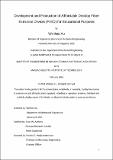| dc.description.abstract | The Fiber Extrusion Device (FrED) is an affordable desktop engineering education tool to aid teaching by creating a laboratory experience. It simulates the continuous fiber draw process, which can provide insights into data acquisition, control systems, smart manufacturing, computer vision, data processing, product design, etc. Designed to be highly modular, the FrED device provides users with a wide range of tunable/adjustable parameters and expansion capacity to enable users to explore beyond the scope of the guided experiment. While successful classroom activities have been conducted using FrED, the 2022 FrED device is still too expensive and heavy to ship to learners worldwide.
This Thesis focuses on product design and development of FrED, making enhancements to reduce cost and mass while increasing the capability. Specifically, the diameter measurement system’s performance was drastically improved by increasing cooling, enhancing fiber stability, introducing a modular pulley system and adjustable tension system, etc. The processor has also been changed from Teensy 4.1 to Raspberry Pi Model 4B to increase the capability to process images during fiber production and to allow users to code using Python rather than C++. To accommodate these changes, the other subsystems are also adjusted for better integration, such as a redesigned PCB.
There are also efforts to improve user safety by following the hierarchy of control to implement visual warnings, physical barriers from hot surfaces, and a thermal switch as an engineering control to prevent thermal runaway of the heater. User experience is enhanced with the virtual monitor connectivity and reduced noise.
Parts are also redesigned to be more compact and use less materials, reducing cost and mass. The final FrED design accomplished a 44.6% reduction in cost over the previous generation of FrED at $149.68 and a 19.7% weight reduction (1.81kg). An initial prototype of the packaging weighs 2.85kg, including the FrED device. The draft assembly manual has been done to pave the way for ramp up. | |
